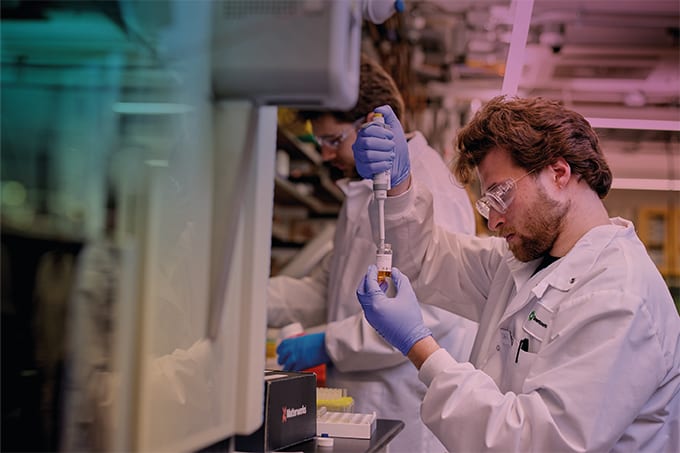Many of today’s labs are at an exciting inflection point as they move closer toward being a digital lab of the future. Some labs are just starting to embark on the journey, while others are making solid progress, making the most of intuitive technologies and instruments, streamlined workflows, automation, cloud-based informatics, and remote tools/resources.
This digital framework provides the volume and type of data needed to accelerate research and innovation. Converting this data and corresponding threads into true data-driven insights is more complex. In fact, laboratory leaders may have to change many of the ways their teams work with data, services, and strategic partners. Lab leaders will also have to shift the necessary skills of their laboratory personnel in order to support the digital framework.
What exactly is the lab of the future?
Everyone seems to have a different opinion of what the lab of the future really means. My colleagues and I focus on three basic industry needs: simplification, optimization, and transformation. As labs across all sectors become increasingly complex, these three factors become central to increasing lab productivity and adding value.
During my 30 years in science and lab technology, I’ve seen firsthand how labs have evolved. In the early stages of my career, my focus was largely on instrumentation portfolios. I was able to appreciate how labs were using their instruments alone to handle increasingly complex scientific needs. However, about 15 years ago when I turned my focus to laboratory services, I saw firsthand the need for laboratories to change, with the core driver being to increase lab productivity. Today the industry has the additional challenge of generating such complex and large data that it now needs new data management approaches along with additional lab support and services.
Historically, service providers have mainly offered product-attached service models (with an emphasis on selling products with services tied in). Though these models can support some elements of a lab’s goals and help return precious time by off-loading support demands from scientists, labs can benefit from using a broader lens to think about the outcomes they really need the lab of the future to deliver.
Three thoughts
Here, I present a few points that can help labs step into a digital future with more confidence.
First, you need to move away from the “break and fix” lab services mentality. A more holistic, vendor- and technology-agnostic partner can help address everything from IT and data management to scientific method development, and from workflow streamlining to regulatory compliance. It’s also important to remember that digital transformation is, at its heart, a classic exercise in change management, which means that services should support and promote change in the lab by building a comprehensive roadmap.
Second, you need to set realistic expectations. Everybody wants to go from 0 to 100 in one jump, but that’s rarely (if ever) possible. Labs should visualize where they want to be in the “long term” – a concept that in and of itself has changed in terms of timeline. A three-year horizon, for example, allows labs to strategically plan ahead but also navigate the fast-changing nature of digital technology. Use your broader vision as a guide but begin with small projects that can be used strategically to build momentum within the organization. Small wins in one lab or one building can and should lead to bigger wins.
Third, you need to think about identifying, standardizing and visualizing data. What are the various data threads within your digital lab that improve overall productivity? What best practices could be put in place to maintain and curate the data to support more data-driven decision making? Once you are able answer these questions, the real test and change management becomes: is your company prepared to act on what your data tells you?
Post-COVID, we have found labs are much more receptive to digital technologies – so transformation is happening at a much faster rate, particularly around remote support and connected systems. Building a comprehensive, yet agile data management and process strategy that reflects this rigorous pace is a chance to ensure you’re moving forward with intent rather than being hampered by excessively long plans that don’t consider unforeseen changes. It also allows lab managers and scientists to consider how to best access and share data and how it can be used to unlock opportunities. One point to also consider in this regard – don’t let perfection get in the way of good.
What’s so exciting about analytical science is that the only real constant is change and evolution- in our processes, in our technologies, and in our insights and discoveries. The lab of today is very different from what it was at the beginning of my career and is very different from what it will look like in 2050.
As we look to the future, we will see labs increasingly adopt more and better automation, miniaturization, mobility and deeper use of AI and ML – all of which will only continue to accelerate. As we move ahead labs may have more collaboration rooms than bench spaces where local and global R&D teams continually make real time, data-driven decisions. In the future, scientific instruments could fit on a single desktop that once filled entire rooms where all technologies naturally “talk” to one another with integrated operational and scientific data streams. Scientists and lab managers could run experiments and operations on smart devices from anywhere, anytime. This vision is becoming a reality faster and faster.
The unwavering constant, now and in the future though will be data and data-driven decision making will represent an unwavering constant! Smart data approaches and strategic services can act as a north star, helping steer your lab to the innovations, approaches, and skills that will help propel your science to reach new heights.




